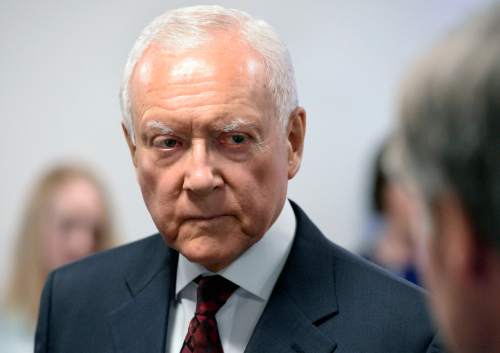This is an archived article that was published on sltrib.com in 2015, and information in the article may be outdated. It is provided only for personal research purposes and may not be reprinted.
Washington • It's not often that Sen. Orrin Hatch and President Barack Obama agree on something but that rare alignment has surfaced with trade legislation that the Utah Republican and the Democratic president are both pushing as a way to boost American exports and jobs.
"When he's right, I'm going to be with him," said Hatch, chairman of the Senate Finance Committee. "And he's right on this one."
While the Senate on Tuesday failed to advance Hatch's legislation, the measure is likely to return for another vote this week.
Democrats blocked the legislation in a 52-45 vote but Senate Majority Leader Mitch McConnell says it would be back before the body as arm-twisting continues to sway votes. The bill needs 60 votes to pass the initial hurdle.
"I hope they'll vote with us to open up debate," McConnell said on the Senate floor Tuesday. "We'll continue to engage with both sides."
The Trade Promotion Authority legislation would essentially allow Congress to vote — up or down without amendments — whether to approve any agreement. It also allows for Congress to set policy goals for trade agreements and calls for the executive branch to brief members frequently.
While the White House and many Republicans are pushing the trade authority, Democrats have come under pressure from unions, who say the legislation would hurt American jobs. The minority party is demanding that the legislation move forward only in conjunction with other measures, including relief to workers losing jobs related to trade deals, and provisions aimed at combatting Chinese currency manipulation.
Obama has been lobbying Congress on the legislation to ensure trade agreements can continue to be negotiated with other countries without fear lawmakers would meddle with individual provisions after a deal has been struck.
Last month, White House press secretary Eric Schultz gave a shout-out to Hatch, telling reporters that the Utah senator's work has been instrumental in promoting trade.
"Senator Hatch been a key player in this," Schultz said. "We appreciate the earnest efforts that he's put forth."
Hatch said it could be disastrous for Congress to amend trade deals during debate, mainly because negotiating partners would be hesitant to put their best proposals forward if they knew Congress could tweak the plans. An up-or-down vote solves that concern, Hatch says.
Hatch says that 375,000 jobs in Utah are supported directly or indirectly by international trade. He adds that those numbers would climb with trade agreements negotiated under his legislation.
Utah annually exports $4 billion worth of goods to countries under the Trans-Pacific Partnership and $3 billion to countries in Europe under the Transatlantic Trade and Investment Partnership. Hatch said it is estimated that Utah families could save an average of $10,000 a year in consumer-goods purchases from increased competition under the trade authority.
Overall, Utah exported $12.3 billion worth of goods in 2014, a 159 percent increase since 2004, according to the Office of the U.S. Trade Representative. Beyond agricultural exports, metals, computer products and chemicals made up a good chunk of those sales.
Derek Miller, the president & CEO of World Trade Center Utah, said the legislation would be a bonanza for Utah businesses, opening up new markets for products, while also protecting Congress' role on the front-end of negotiations.
"We are a strong trade state so there are obviously benefits to us," Miller said. "The more level the playing field, the better it is for Utah."
Democrats and unions have argued that taking away Congress' right to amend trade deals could cost American jobs as businesses decided to move production elsewhere.
"I have been very clear that I am not a fan of fast-track," Senate Democratic Leader Harry Reid said Tuesday.
Last month, some top Democrats and unions held a rally at the Capitol to argue against Hatch's legislation.
"Our trade policies should level the playing field, punish those who violate the law and strengthen our middle class," said Sen. Sherrod Brown, D-Ohio, according to The Hill newspaper. "The last thing we need is another trade deal negotiated behind closed doors and rushed through Congress."
The president of the American Federation of Government Employees, J. David Cox, told the crowd at that event that workers shouldn't just say "no" to the legislation, but "hell no," The Hill reported.



